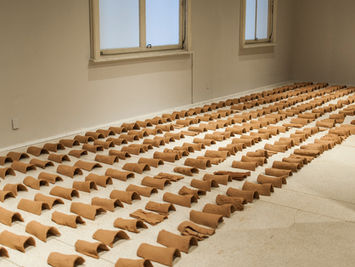2018
11th Mercosur Biennial
curator
Alfons Hug
Under the title Atlantic Triangle, the 11th Mercosul Visual Arts Biennial is curated by Alfons Hug and Paula Borghi and aims to take a look at the triangle that, for more than 500 years, has connected the destinies of America, Africa and Europe.


BIENNALS
CURATORIAL project
Titled "Atlantic Triangle," the 11th Mercosul Visual Arts Biennial is curated by Alfons Hug and Paula Borghi and aims to explore the triangle that, for over 500 years, has connected the destinies of America, Africa, and Europe. Bringing together approximately 70 artists and artist collectives—in addition to specific initiatives held in Quilombo communities located in the cities of Porto Alegre and Pelotas—the exhibition runs from April 6 to June 3, 2018, at the Rio Grande do Sul Art Museum, Rio Grande do Sul Memorial, Santander Cultural, Praça da Alfândega, and Nossa Senhora das Dores Church, in Porto Alegre's Historic Center. Based on the historical references identified during the exhibition's preparation, the curatorial project features works and artists from the three continents that make up the Atlantic Triangle. By making these artists the protagonists of an exploration of the relations of cultural tension and contextual interdependence within this triangulation, the exhibition seeks, among other questions, to analyze the innovative forces that mobilize the interaction between America, Africa, and Europe. Highlighting African and Afro-Brazilian art—both presented in great detail in the exhibition—Atlantic Triangle explores the points of contact that foster the encounter between Indigenous, European, and African cultures, forming a new American amalgam. Thus, offering itself as a timely experience of visibility, from an artistic and cultural perspective, of the diaspora (a term that defines the displacement, usually forced, of large masses of people originating from a given area to several distinct host areas), the 11th Mercosur Biennial also aims to emphasize reflection on how the exodus from the Black Atlantic fueled a vigorous process of creolization, which led to an intense movement of religions, languages, technologies, arts, and cultures. Furthermore, by highlighting that the cultural diversity of Africans, comprised of hundreds of ethnic groups and languages, was as plural as that of indigenous cultures, the exhibition also seeks to reflect on the fact that even after a arduous attempt to erase these cultures, phenomena such as syncretism and miscegenation—although a direct reflection of historical violence—represent a form of resistance and cultural enrichment. Without aiming to provide immediate answers to plural questions that expand beyond the artistic and cultural realms, the exhibition aligns with reflections from the philosophical, political, and anthroposocial fields by considering that, far from being complete—since, through immigration, influences from other cultures have been added to this process—the course of the triangle's fusion is still far from complete. Considering that in the artistic field – as perhaps in no other field of reflection – different conceptions of nature, time and space continue to transform into a highly dynamic system, the 11th Mercosul Biennial believes that contemporary art, by highlighting conflicts and disturbances that arise in the clash between diverse civilizations and social classes, can constitute, in addition to a forum for presenting innovative artistic expressions and techniques, also a powerful instrument of reflection and criticism – capable, perhaps, of putting its finger on the open wounds of the Atlantic triangle.
Alfons Hug
STAFF
Chief Curator
Alfons Hug
Assistant Curator
Paula Borghi
ARTISTS

























